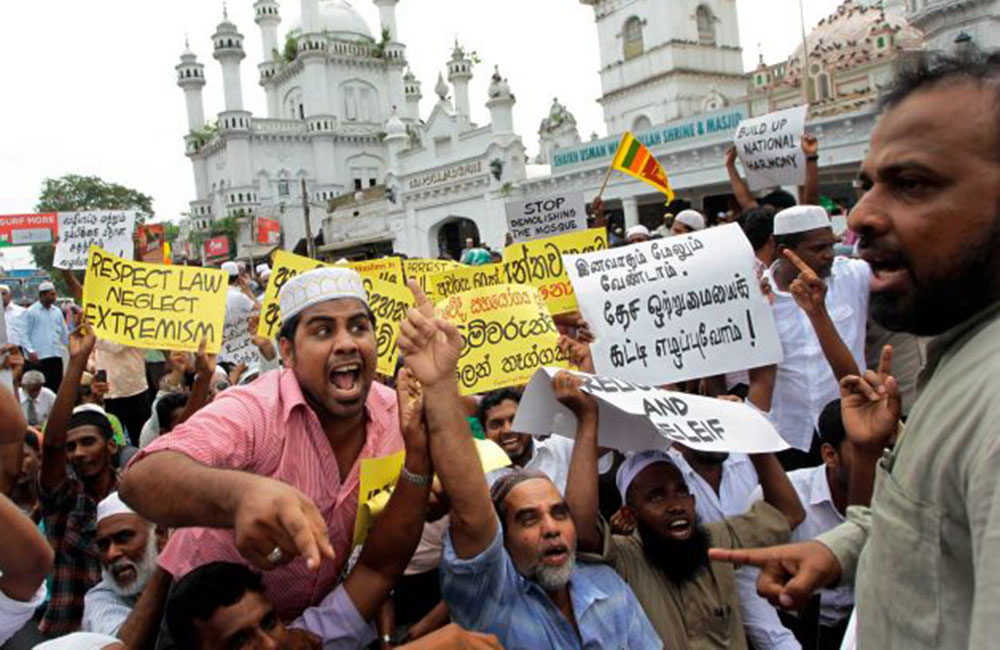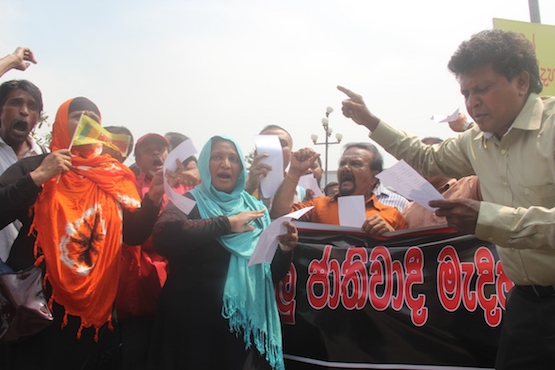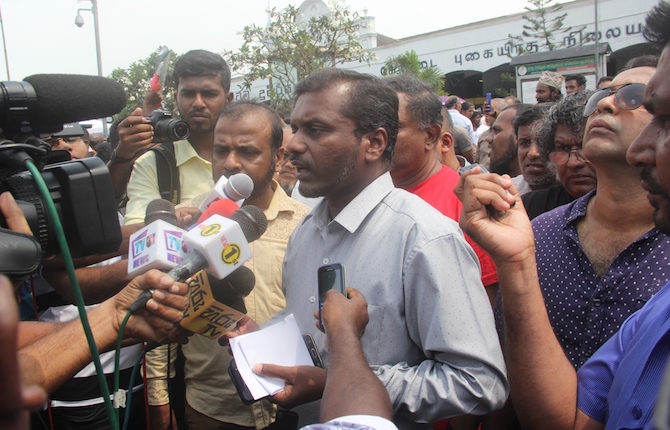Leaders of different religions come together to work toward ending 'fear, hatred and suspicion'.
Hundreds of demonstrators including Muslim women shout slogans condemning anti-Muslim violence in front of Fort Railway Station in Colombo on March 8. (ucanews.com photo)
Hundreds of Muslims and rights activists have demonstrated against anti-Muslim attacks in Sri Lanka.
Activists urged the government to ensure the security of Muslims and every citizen as tensions rise across the country.
The government declared a nationwide state of emergency on March 6 for 10 days after religious violence in Kandy. A police curfew has been imposed in the Kandy administrative district and the government has blocked social media networks in an effort to quell the violence.
Many Muslim-owned businesses, shops and houses have been set on fire in recent days.
Saman Rathnapriya, a human rights defender and trade union leader, said Sri Lanka had never learned any lessons from previous communal violence. Those who need power again are behind recent incidents, he said.
He called on all law enforcement authorities to act without partiality and to consider their paramount duty to ensure the security of every citizen and to maintain law and order.
"Former president Mahinda Rajapaksa's regime helped to grow racism and now the results are very negative. Some politicians and Buddhist extremists are responsible for these attacks but the government and authorities are inactive and not taking proactive measures," Rathnapriya told a gathering in front of Fort Railway Station in Colombo on March 8.
"We ask Mahinda Rajapaksa not to spread racism — people should unite to protect our country as one nation."
Hundreds of demonstrators including Muslim women sang slogans against extremist Buddhist monks, government politicians, the president, prime minister and Buddhist mobs. Similar demonstrations were held in several parts of the country.
Tensions erupted after a Sinhalese lorry driver was killed by a group of Muslim men in Kandy. According to local people, Buddhist mobs from outside the area came to Kandy to carry out planned attacks.
Similar anti-Muslim violence erupted in the east of Sri Lanka last week after a rumor spread about birth control pills being served in a Muslim restaurant in Ampara to unsuspecting Sinhalese customers. This fed into Sinhalese fears of a conspiracy by Muslims to reduce the Sinhalese population.
Saman Rathnapriya, a human rights defender and trade union leader, addresses people in front of Fort Railway Station in Colombo on March 8. (ucanews.com photo).
Religious leaders appeal for calm
Religious leaders have urged the government to ensure the security of every citizen and to maintain law and order.
They called for immediate action to be taken against perpetrators of violence and for measures to restore normalcy in affected areas.
"Kandy is very sensitive with all religions living peacefully. But if there are issues, a common forum is needed provided the state supports such a meeting," Bishop Vianney Fernando of Kandy told ucanews.com. "We uphold this land belongs to all to live in harmony."
Bishop Fernando said priests at local level were involved in inter-religious meetings but there were no follow-ups.
He said religious and political authorities were acting in a reactive manner and not taking proactive measures to curb these situations.
Bishop Winston Fernando of Badulla, president of the Catholic Bishops' Conference in Sri Lanka, said in a statement that it is destructive to give a religious twist to isolated incidents, leaving room for extremists to create a conflagration.
He said he was deeply concerned about the disturbances.
"We should look at all incidents as having potential to unleash violence," he said. "We do not need outsiders to teach us the importance of living in peace and harmony; we have the four major religions to teach us of the spiritual values."
Sri Lanka blocked social media networks including Facebook, Instagram, WhatsApp and Viber temporarily to help quell the violence.
Muslim cleric Mowlavi H.M. Rizwan of the Kandy Mosque told ucanews.com that, under the leadership of Buddhist monks, Muslim priests, Christian priests and Hindu priests have come together to ensure people in remote villages of Kandy do not get involved in the violence.
In the villages of Yakgahapitiya, Ampitiya, Madawela, where some small incidents occurred on March 6-7, leaders have told residents to remain calm and not get involved.
Rizwan said Sinhalese and Muslim people are working together and with religious leaders and the armed forces to protect villages by not allowing any outsiders to enter. He said outside agents were involved in inciting violence in these villages.
The United Nations in Sri Lanka urged authorities to take immediate action against rioters and to swiftly restore normalcy.
Tibbotuwawe Sri Siddhartha Sumangala Mahanayake Thera of the Malwatte Chapter said political divisions are the major contributory factors toward the violence.
The National Christian Council of Sri Lanka appealed to all peace-loving citizens to consider the heavy price of nearly three decades of war and to work toward the peaceful resolution of issues causing recent acts of violence.
"We appeal to all political parties and other formations to act with restraint and not to contribute further to the destabilization of an already fragile government, causing greater harm to the economy and ultimately negatively affecting the poorer sections of our people," said Christian leaders in a statement.
"We appeal to all religious leaders to act together, sustained by our spiritual resources, to work toward resolving all the fear, hatred and suspicion that arises at a time like this."
(ucanews)



Leave your comments
Login to post a comment
Post comment as a guest